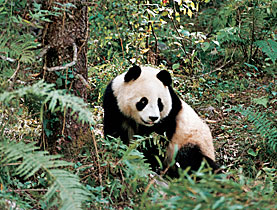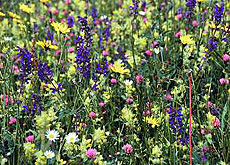Nations “must do more” to stop species loss

Switzerland is among the 191 nations meeting in Bonn, Germany, to discuss what can be done to stem the "unprecedented" loss of the world's biodiversity.
United Nations experts have warned that human activity, including global warming, threatens to cause the worst spate of extinctions since the dinosaurs died out 65 million years ago.
Around 4,000 participants, including Swiss Environment Minister Moritz Leuenberger, will try to agree ways of slowing the biodiversity decline rate at the two-week United Nations Convention on Biological Diversity (CBD) meeting, which opens on Monday.
In 2002 the signatories agreed a goal of lowering flora and fauna loss by 2010. But the outlook is not positive.
“Unfortunately I have to say that it is quite obvious that we will not meet this goal,” Thomas Kolly, head of the Swiss delegation to Bonn, told swissinfo.
Kolly is hoping for a strengthening of countries’ commitment to do “everything possible to get closer to the 2010 objective”.
“That could give a lot of energy into the national processes to do more by 2010,” he added.
Critics have pointed to a lack of guidelines. Key countries, such as the United States, are missing. The US will be attending the meeting as an observer.
Ministerial action
Environmental group WWF International, based in Gland in Switzerland, wants action from ministers.
“We’re hoping that environment ministers who recognise that they can’t reach the target on their own will [see the] need to be cooperating much more with other sectors of government such as agriculture, fisheries, health and even mining sectors,” Rolf Hogan, the group’s CBD manager, told swissinfo.
“These sectors play a role in the destruction of biodiversity but a lot of them also depend on it – fisheries depend on good fish stocks being available, so there is a need to protect fish nursery areas,” he added.
Another problem is that the accord, agreed at the 1992 Rio Earth Summit, has been overshadowed by its climate counterpart, the UN Convention on Climate Change.
“Many things happen in biodiversity which are less visible than in climate change, the loss of species happens every day but we as the public hardly notice. Very often it’s just the specialists,” explained Kolly.
“This has led to a situation where we are in a less stringent system for biodiversity than for climate change.”
WWF International would like a joint programme of work between the two conventions highlighting the effects of global warming on biodiversity.
This would also show how biodiversity can contribute to climate change adaptation and mitigation – such as keeping food crops’ wild relatives to breed with domesticated ones against new crop diseases, said Hogan.
Genetic resources
The meeting also wants to agree on a road map by 2010 on access to genetic resources – by industrialised nations for products such as medicines – and the sharing of the benefits derived from their use – for the developing countries concerned.
Swiss non-governmental group Berne Declaration recently lent its support to a South African village fighting two patents on extracts of a local plant used by a German pharmaceutical company.
“We hope with this international regime in Bonn that the duty of the user countries, like Switzerland, will be much more explicit and precise,” said the group’s François Meienberg ahead of the meeting.
Kolly says that Switzerland, which has an important pharmaceutical and chemical industry, supports the objective of concluding the negotiation on access and benefit sharing by 2010.
In this context Kolly explained that Switzerland, in the framework of the World Intellectual Property Organization (Wipo), also promotes the idea that when a patent is applied for, the origin of the natural resources and traditional knowledge has to be declared.
swissinfo, Isobel Leybold-Johnson
The ninth meeting of the Conference of the Parties (COP 9) of the UN Convention on Biological Diversity (CBD), takes place in Bonn, Germany, from May 19 to 30, 2008. The fourth meeting of the Parties to the Cartagena Protocol on Biosafety took place in the preceding week.
COP 9 will also coincide with the International Biodiversity Day, on May 22.
The CBD is one of the three agreements under international law that were passed at the UN Conference on Environment and Development in Rio de Janeiro in 1992.
The three goals of the CBD are to promote the conservation of biodiversity, the sustainable use of its components, and the fair and equitable sharing of benefits arising out of the utilisation of genetic resources
There have been warnings of a global food crisis following the record high prices for basic stapes such as wheat, corn and rice and reduced food stocks.
Some CBD experts believe that renewing agricultural and livestock diversity could help tackle the problem. 75 per cent of food crops once grown are no longer cultivated.
Apart from agriculture, a key discussion point at Bonn will be biofuels, which have been criticised in some quarters because they are sometimes made from food crops.
On July 1, Switzerland plans to introduce environmental and social standards that have to be met to gain a tax exemption on biofuels. It is the first country to introduce such a measure and it will present the move at Bonn.

In compliance with the JTI standards
More: SWI swissinfo.ch certified by the Journalism Trust Initiative



You can find an overview of ongoing debates with our journalists here. Please join us!
If you want to start a conversation about a topic raised in this article or want to report factual errors, email us at english@swissinfo.ch.